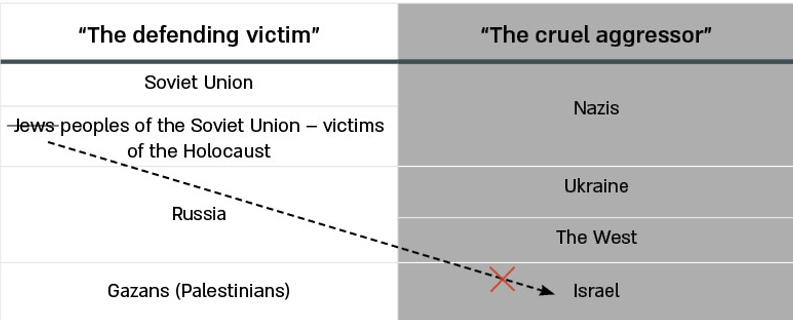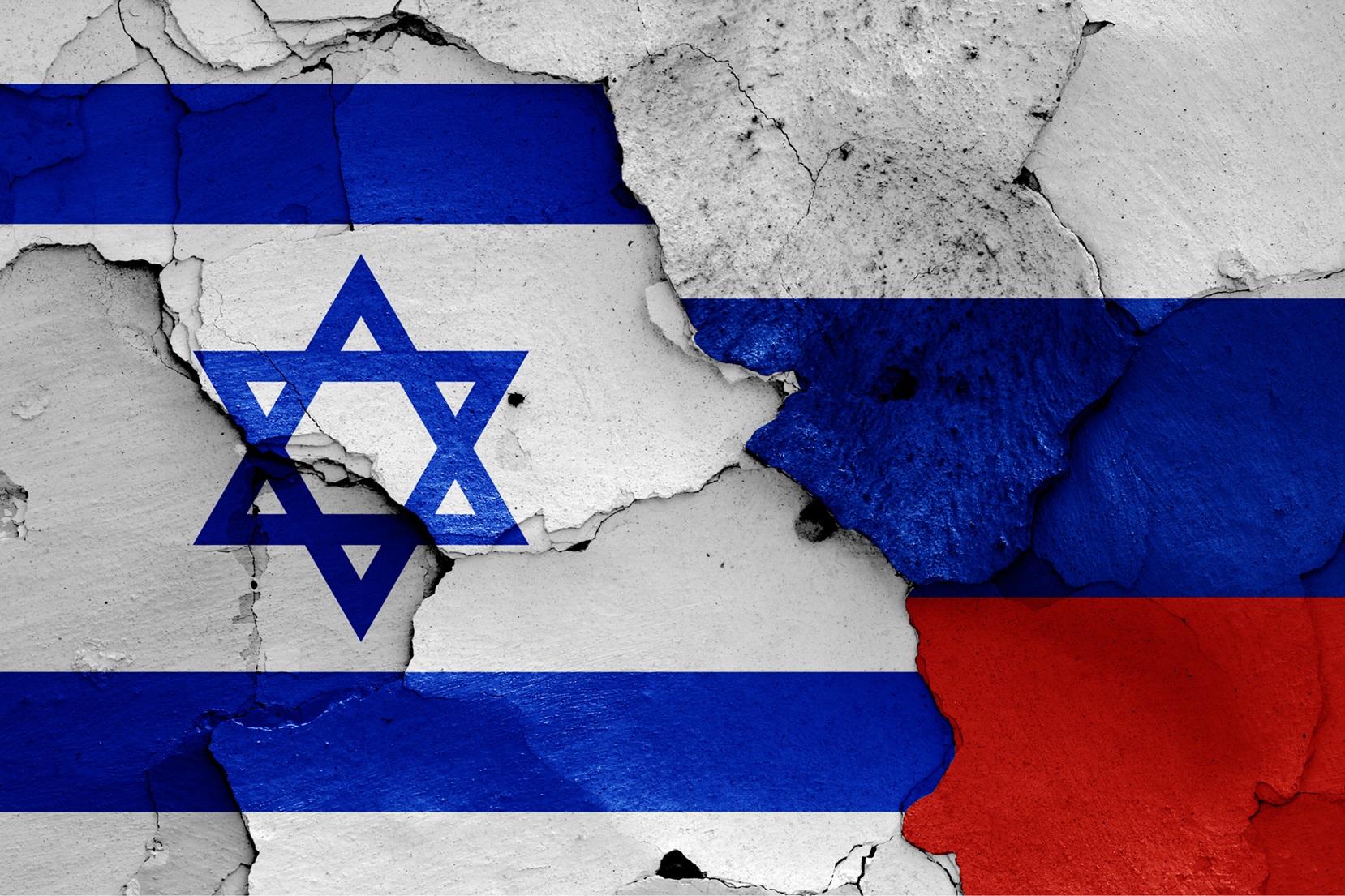Publications
INSS Insight No. 1859, May 29, 2024
Within the framework of its struggle against the West and Ukraine, Russia divides the world between “cruel aggressors” and the “defending victims.” The ideological-historic basis for this narrative comes from the Soviet Union’s struggle against Nazi Germany. In recent years, the direct connection between Israel and European Jewry, which is a clear example of a victim, has become blurred, and now Jerusalem is being portrayed as a “cruel aggressor” against a new “defending victim”—the Palestinians. This logic perfectly explains Russia’s hostile policies toward Israel since October 7. The narrative is a propaganda tool used by Russia for political purposes and is particularly designed to justify its aggression against Ukraine and rally the Global South against the West. The role that Israel was given in this story was and remains entirely instrumental, which explains why Russia, a country that once dedicated itself to preserving the memory of the Holocaust, is now cynically using that memory to denigrate Israel.
Since the outbreak of Operation Swords of Iron—Israel’s war against Hamas in the Gaza Strip—Russia has made a series of unprecedented claims against Israel, including comparing the Israeli military operation to Nazi atrocities in World War II and the Holocaust. In this context, President Vladimir Putin’s assertion that the situation in Gaza was comparable to the German siege of Leningrad was especially noticeable, as was Foreign Minister Sergey Lavrov’s comment that “the Israelis shouldn’t even try to create an impression that because of their sufferings during the Second World War they can do whatever they want right now.” And in November, Russia’s ambassador to the United Nations, Vasily Nebenzya, argued that Israel does not have the right to self-defense against Hamas in the Gaza Strip as it is an “occupying force.”
At the same time, Russia insists on presenting Hamas’s political wing as a legitimate player on the political stage, almost on equal footing with Israel. Moscow maintains open relations with Hamas and reinforces the image of the Palestinians (and Hamas as their representative) as the weaker, legitimate side, defending itself in the conflict with Israel. Moreover, the Russian Foreign Ministry has refrained from condemning Hamas for the October 7 massacre. Even though Russian diplomats occasionally claim to have condemned Hamas—usually saying that they “have condemned,” in the past tense, rather than “we condemn” in the present tense—these statements have been nothing more than mere condemnations of some general terror attacks, without specifying responsibility or the identity of the perpetrators.
This follows a consistent trend in the Russian narrative regarding World War II and the parties in that conflict, including in the context of the Jewish people in the Holocaust and the State of Israel. This trend has existed for many years, becoming significantly more pronounced since the Russian invasion of Ukraine in February 2022 and even more so since the outbreak of Operation Swords of Iron. The key element in this approach is the differentiation between the “defending victims” (the “we,” with the emphasis on Russia) and the “cruel aggressors” (the “them”). Over time, Israel has also been included as part of this narrative, ironically on the other side.
This narrative started to take shape in the mid-to-late 2000s when the international-diplomatic approach of the Russian leadership under Putin underwent a change: The West and pro-Western forces in the Commonwealth of Independent States began to be seen in a negative light. Since then, the narrative has significantly expanded and radicalized and now also includes the Israeli-Jewish issue. At its heart is a very fundamental idea of simplifying the world picture for the target audience (first and foremost the Russian people), differentiating between the “good guys” and the “bad guys,” and separating both worlds as much as possible.
Russia uses the story of World War II to strengthen its image as being on the side of the “good guys.” The war always played a central role in the Soviet ethos—it was a formative national experience, especially since losses on the Soviet side were several times higher than those of the Allied forces and the Nazi axis, and every Russian family has its own war story. Therefore, the homeland is also seen as the victim, as well as the victorious protector.
The first stage was to adopt the victory of the Soviet Union over the Nazis, as if it were a victory for modern-day Russia. In other words, Putin’s Russian state came to be perceived as both the defending victim and the victor. The story of World War II has become a tool for political recruitment, for the purposes of unifying the nation (it is, after all, a story that touches everyone in Russia) and, over the years, increasingly as a confrontational narrative, which differentiates between the Russian nation and all other nations.
The “bad guys” in the narrative—the “cruel aggressor”—referred originally to the Nazis. The use of the Jewish example was convenient and fit into the narrative, and Russia even promoted international initiatives to commemorate the Holocaust as a crime committed by the Nazis and their accomplices.
In the 2000s, however, former member states of the Soviet Union (especially the Baltic states and Ukraine) started to move closer to the West and turn their historical nationalist forces into national heroes, in an attempt to bolster their own national identity at the expense of the Soviet heritage. In the mid-20th century, some of these forces fought against the Soviet regime (including cooperating with the Germans). That was the excuse for Russia to include them in the pro-Nazi narrative and to describe the modern-day regimes that glorify these heroes (especially Ukraine since 2005 and even more so since 2014) as neo-Nazis themselves.
Russia worked hard to cement this image (“Ukraine is the successor of supporters of the Nazis; Russia is the successor of the Soviet Union as the hero of the struggle against Nazism”) in the public perception: One of the goals of the “special military operation” in Ukraine, as Putin has referred to the invasion, is the “de-Nazification” of Ukraine. As long as this remains a convincing narrative among the target audience, the war in Ukraine continues to be morally justified. On occasion, the Kremlin goes even further in its efforts to besmirch Ukrainian nationalism, absolving the Germans of culpability for Holocaust atrocities committed on Ukrainian soil and saying that the Germans did not participate in the mass murder of Jews—rather, such acts were carried out exclusively by Ukrainian nationalists.
Over time, this dichotomous narrative between the “defending victims” and the “cruel aggressor” expanded to include the West, under the leadership of the United States, as an unjust hegemony that threatens the “independent” nations in the world—Russia, China, and countries in the Global South. In so doing, Russia also turned itself into the “protector of the weak” against Western threats. The West’s steadfast support for Ukraine even helped Russia portray the West as a successor to the ideology of the Nazis.
Until a certain point, Russia had used the narrative of antisemitism in World War II when it compared itself to the persecuted Jewish people. It did so by referring to Russophobia—a propaganda term that is used to dismiss any Western criticism of Russian aggression. However, over time, the connection between Israel and European Jewry, the main victims of Nazi crimes, stopped serving the interests of the Russian narrative. Upon recognizing that Israel does not stand beside it in its war against Ukraine, Moscow began to promote a narrative whereby the Jewish victims of World War II are not actually represented by the modern State of Israel, which now behaves as the aggressor toward the Palestinians and Syria. Moreover, the Jews apparently did not constitute a unique case of genocide perpetrated by the Nazis; rather, they were one in a long list of victims, which also included the various peoples who lived in Russia.
In the Soviet Union it was customary to downplay the Nazis’ focus on the Jews and instead to highlight the Soviet citizenship of the victims. However, since the dissolution of the Soviet Union, there has not been much political use of the identity of the victims of the Holocaust, except for in Holocaust denial narratives. However, since the crisis with Ukraine, the issue has become increasingly important for the Russian regime. Now Russia has been highlighting the “minorities” clause (which it interprets to mean “the peoples of the Soviet Union”) and is trying to equate the Holocaust with the concept of genocide in general, while ignoring the essence of “the final solution of the Jewish problem” and replacing it with “the genocide of the Soviet people” by explaining it with the number of Soviet victims during the war. In so doing, Russia is returning to the Soviet practice of rewriting history to suit current political interests. Moreover, it is fundamentally disavowing the lessons of the Holocaust by claiming that Germany’s recognition of its commitment to the Jewish people (and not to the Soviet Union) for the crimes of the Nazis is, in fact, a new incarnation of racism and the Nazi ideology.
The narrative that differentiates between Judaism and being the “victim” in the context of World War II was also promoted by Russia before October 7. For example, in 2022, Foreign Minister Lavrov, despite acknowledging the fact that Ukrainian President Volodymyr Zelenskyy is Jewish (a painful subject for the Russians, since they are trying to accuse him of supporting Nazism), said that Hitler allegedly had Jewish roots, meaning that being Jewish does not mean one cannot also be a Nazi.
Russia fits the war against Hamas into its narrative by portraying the people of Gaza as victims of a genocide perpetrated by Israel. In the analogy, the Palestinians are like Russia, defending themselves from the cruel aggressor (the West)—and even Western support for Israel is seen as an expression of “neo-Nazism” (see Figure 1).

Figure 1. “The defending victim” vs. “The cruel aggressor”
In the end, the messages from the Kremlin make a clear and logical claim: Israel is committing crimes against the Palestinian people; Israel and the entire West have forgotten the lessons of World War II; their behavior is a continuation of the Nazi ideology, which brought disaster and genocide to the people living in Russia—in contrast to Russia, which is on the right side of history, protecting the victims and fighting against the modern incarnation of Nazism.
Russia’s use of these narratives is a calculated tool in its information and propaganda warfare, which targets a wide variety of audiences, including the West and Israel. For the Russians, this is an inherent part of an ongoing confrontation that is not limited to just military rivals during wartime.
The Israeli establishment’s tepid response to Russia’s adoption of this policy of rewriting historic narratives has raised serious concerns. The lack of opposition from Israeli authorities to the toxic Russian narrative—such as their silence in the face of the use of concepts such as “Nazis” and “genocide” in the context of the conflict between Russia and Ukraine and the West—has undermined Israel’s ability to develop a political-rhetorical tool to effectively deal with the Russian accusations, which are now directly aimed at Israel.



